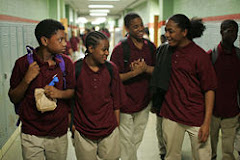I entered my classroom prepared for the worst, but apparently the leak has been fixed. I say "apparently" because the fixers left their ladder in the middle of the floor and didn't clean up anything, so the room itself looked terrible - broken tiles everywhere with grime and sand (where does that come from?) across the floor. The heaters still don't work so I allowed hats, coats, and gloves today in the room - at least for first period, before I decided to take all my classes down to the library.
I put a sign on the door saying Due to the deleterious conditions of the classroom, all Mr. _______'s classes will meet in the library today. You know, never miss an opportunity to teach a new vocab word!
As for my classes, they went wonderfully, after first period. I'm trying Recriprocal Reading, something I researched a bit for one of my Reading classes this fall (I'm not ready to give the classes any credit, though, so don't think I'm going there - tonight was my 2nd to last meeting for one of the classes and it will be so nice not to waste three hours of my life every week after next Monday). I put them in groups of three, and had them read The Odyssey stanza by stanza. One kid was the reader and questioner, one kid was the summarizer and dictionary look-upper, and one kid was the literary analyst and device finder. Hopefully, in a couple of days, I can wean them off the small groups to having them read it independently. I had a few whines of "I can't read this, I don't understand anything" once they realized we weren't going to do the whole-class-reads-and-I-and-the-smarter-kids explain thing, but they got it eventually. The Fagles translation is very modern so there really is no excuse not to comprehend it as they are reading.
As for my Juniors, I'm steadily making my way through the essays. Somehow I have 15 left but, of those 15, I've started graded all of them. I just can't seem to stick with one bad essay more than a page or so before moving onto the next one. I have the patience of a saint but these try my patience. It's hard not to take the bad, sloppy writing personally. I mean, remember Ace of Base? That band back in the early 1990s, which had lyrics that seemed like they were translated from a different language by someone who really didn't know English very well? That's what the students' essays remind me of - bad translations. There is no fluidity and not much logic, and it's so disappointing. They have no voices. I can understand what they say when they talk to me, as there is a logical progression of ideas. Why is it so much harder with the writing? I know part of it is something I've certainly been guilty of before - peppering an essay I really didn't want to write with enough obtuse BS so hopefully the professor didn't read it too closely. That, I am sure, is part of it - they just don't know how to write about literature very well and try to get themselves up to the minimum word count by writing purposefully in circles. At other times, though, I'm mystified. My favorite comment to write on these papers is one that I cannot write, but only think in my head: "WTF?".
On the positive side of things, several students improved dramatically, and I gave my first grade over an 80. But there are several grades below a 50. I just have to remain faithful that they all will become decent writers by the end of the year, and figure out (more) ways to help them.
Another main weakness is the lack of devices. IB requires students to examine the effect of literary devices, and our students are unprepared to discuss devices as much as they should. I spent a good chunk of the weekend creating a document that listed a number of devices that will make it easier to discuss Unbearable Lightness of Being, and today we did an activity surrounding that. Hopefully that helps the next set of essays. It was good for me, too, to research the difference between all those terms dealing with dualism and opposition: antithesis, juxtaposition, dichotomy, foils, oxymoron, paradox, etc.
Resep Masakan
11 years ago

3 comments:
I use a lot of those terms when teaching "Hamlet," and we too have to spend some time breaking them down and comparing them to teach other. On the first batch of Hamlet essays, I usually have to spend a fair amount of time writing "Avoid plot summary-- focus on technique" over and over in the margins!
I like the idea of small groups with those assigned roles-- we're starting a Bible as Literature unit after the Tgiving break, so will keep that in my pocket for my 9th graders.
I wonder if their writing would be any clearer if you gave them a few short projects and told them specifically not to worry about the word counts, but give them clear rubrics with regard to what specifically needs to be addressed.
I realize that some of these assignments may have to be of a specific length, but perhaps some practice on answering the question as succinctly as possible can actually help in this regard. I know that the elementary and middle-level MSAs sometimes depend on a relatively small word count (don't write outside the box-type stuff); does this happen at the HS level as well?
I model the assignments after the IB assessments, which are 1000-1500 words. You're right, and I've already been considering ways to make them write more, smaller pieces to develop their voices.
Post a Comment